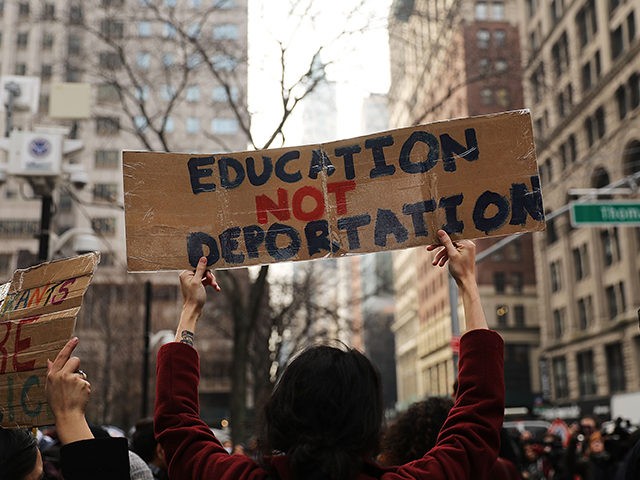Institutes of higher education are in the business of educating, but California community colleges are focused on suing the federal government for not providing money to students attending these schools who are not citizens but are protected from deportation for being in the country illegally through the Obama-era Deferred Action for Childhood Arrivals (DACA).
Close to a million DACA recipients — or “dreamers” as open borders advocates have dubbed them — attend these colleges and deserve money from the government, according to the Los Angeles Times:
California Community Colleges Chancellor Eloy Ortiz Oakley and the system’s Board of Governors filed suit this week in U.S. District Court in San Francisco against the Department of Education and Secretary Betsy DeVos over eligibility restrictions placed on the use of federal aid money for students, arguing that the restrictions are unconstitutional.
“The Department of Education ignored the intent of the CARES Act to give local colleges discretion to aid students most affected by the pandemic, and instead has arbitrarily excluded as many as 800,000 community college students,” Oakley said in a statement.
The CARES Act, approved by Congress March 27, set aside $14 billion for higher education relief. At least half of the money must go directly to students in the form of emergency grants.
Guidance from the Department of Education said that only students who are eligible for federal financial aid can get assistance, which leaves out DACA recipients, “students without high school diplomas; students enrolled in non-credit programs; and students who fail to maintain satisfactory academic progress.”
The Times reported that that the number of students with those statuses numbers 500,000, including 70,000 “undocumented students.”
The school system argued that those left out include veterans, students with disabilities, and students training to be healthcare workers and first responders, according to the chancellor’s office.
“Many students who may be most in need of relief will be deprived of assistance during this public health crisis,” the lawsuit claimed.
“Congress provided higher education institutions with unfettered flexibility to distribute the relief to affected students as they deemed appropriate, imposing no eligibility limitations,” it said.
“There is no persuasive legal support for the proposition that Congress intended the CARES Act to create an entitlement for DACA recipients and others who are otherwise ineligible for federal public benefits,” Angela Morabito, a spokeswoman for the Department of Education, said in a statement. “The CARES Act clearly ties eligibility for this funding to Title IV eligibility… it is absurd that special interests want the department to fabricate a basis to send U.S. taxpayer money to non-citizens, especially given how many American students are in need of this emergency relief.”
Kevin Wallsten, a political science professor at Cal State Long Beach who studies policymaking, said in the Times report that the suit might be difficult to win because of the “tremendous deference” given to federal agencies implementing congressional laws.
Meanwhile, while institutes of higher education are trying to get money for students, some wealthy universities have yet to return money received from the CARES Act, including Columbia University, as Breitbart News reported:
Columbia University has yet to announce whether it will accept $12.8 million in federal coronavirus relief that it is eligible for under the CARES Act despite its $11 billion endowment. Several other Ivy League institutions, including Harvard, Yale, and Princeton, have already announced that they will reject federal funding following pressure from President Donald Trump and the general public.
According to a report by the Daily Pennsylvanian, Columbia University has yet to reject $12.8 million in federal funding that they are eligible for under the CARES Act, a coronavirus relief program passed by Congress in March.
Follow Penny Starr on Twitter

COMMENTS
Please let us know if you're having issues with commenting.